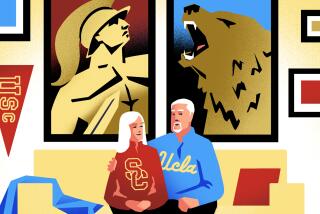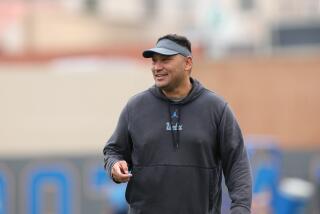SPLIT PERSONALITIES
The question seems reasonable, even predictable, but Norm Chow wants no part of it. He shakes his head repeatedly, raising his hands as if to ward off an intruder.
With this year’s USC-UCLA game fast approaching, the Bruins’ offensive coordinator refuses to discuss the time he spent coaching at that other school.
“There’s nothing to talk about,” he says.
The fact is, this year’s edition of the cross-town rivalry involves more than football. The game looks to be a mismatch, so the real drama might be on the sidelines with a delicate web of relationships and hints of sour history between coaches.
Start with Chow and USC Coach Pete Carroll, seemingly the perfect duo -- the offensive guru and the defensive specialist -- combining to rebuild the Trojans in 2001. After four seasons, Chow was gone.
Add UCLA defensive coordinator DeWayne Walker, who served as Carroll’s associate head coach for one season before leaving in 2002. Landing at UCLA a few years later, he engineered the 13-9 upset that knocked the Trojans out of the 2007 national championship game.
Then there is Steve Sarkisian, USC’s current offensive coordinator. Years ago, Walker recruited him to play quarterback at Brigham Young, where Chow nurtured him into a starter. It was Sarkisian who rejoined the Trojans’ staff as part of a reorganization that nudged Chow to the NFL.
Now, private quarterbacks coach Steve Clarkson, who has ties to both programs, compares the rapport between the former colleagues to “the elephant in the room.”
“If I’m with Pete or Sark, Norm’s name doesn’t come up,” he says. “And vice versa when I’m with Norm. It will always be the great ghost.”
A ghost that might hover over the Rose Bowl on Saturday when Carroll, Chow, Sarkisian and Walker step onto the same field for the first time in seven years.
Prince of the city
For all the success Carroll has enjoyed at USC -- two national championships and six major bowl games in eight years -- some fans can’t help but wonder what might have happened if Chow had stuck around.
The highly regarded offensive coordinator jumped to a similar position with the Tennessee Titans in 2005 after pursuing the head coaching position at Stanford. Carroll was considering a plan to promote him and, at the same time, relieve him of play-calling responsibilities.
Carroll later said he was merely exploring different combinations in case Chow or other assistants left. Some close to the program believe the coach was remaking the staff to align with his own persona -- youthful, energetic to the point of frenetic -- an ambience that did not fit Chow’s professorial temperament. Carroll ultimately handed the offense to young Lane Kiffin and Sarkisian, back after a one-year stint with the Oakland Raiders.
In the years since, Carroll says he has spoken with Chow infrequently but added that he rarely has contact with former assistants, especially those he coaches against. Carroll has nothing but praise for his former coordinator.
Chow “did great when he was here. We had a great time, won a bunch of games and had a lot of fun,” Carroll says. “I don’t think that there’s a whole lot more to it. . . .
“I’ve always promoted him in every way that I can and helped him in every way that I could.”
As for fans wishing they had never split, Carroll recalls “a time when people were saying that. I don’t hear much of it anymore.”
Saturday marks the first time they will game plan against each other. Carroll is looking forward to the matchup and dismisses the notion that this game resurrects unanswered questions.
“He made a million dollars,” Carroll says of Chow’s leaving for an NFL-sized salary with the Titans. “That’s pretty good.”
The master
When Chow arrived at USC as part of Carroll’s first staff, he was well aware of the stakes.
“The only reason we’re here is because the other guys couldn’t get it done,” he said at the time. “If we don’t get it done, someone else will be here.”
Chow got it done by way of developing Carson Palmer and Matt Leinart into Heisman Trophy-winning quarterbacks, which made his departure all the more painful for USC fans who envisioned a string of national titles.
The 62-year-old Chow -- after two days of declining to answer questions about his time at USC -- speaks briefly of winning games and championships and having fun with the Trojans. He thanks Carroll for giving him the chance to work in the Pacific 10 Conference and jump to the NFL.
“I have nothing but good memories of what happened there,” he says of USC. “You move on, just like in football you move on to the next play.
“There was nothing negative about my time there. I made some tremendous friendships and relationships that will last a lifetime.”
But he won’t talk about the specifics of his departure. And he won’t talk about Sarkisian. The kid he mentored at BYU. The young coach he recommended to USC as a graduate assistant in 2001.
Clarkson, whose work with USC recruit Matt Barkley and UCLA recruit Richard Brehaut keeps him in touch with both staffs, senses a divide. He says: “Norm really felt like [Sarkisian] was an extension of his family.”
The apprentice
Back when he played quarterback at BYU, and when they coached together at USC, Sarkisian said that he and Chow spoke several times a day. Now, they have not talked in nearly four years.
“I loved playing for him,” the 34-year-old Sarkisian says. “I loved working with him and I think someday it will be better than it is now.”
Unlike Chow, Sarkisian is willing to reminisce.
His part in this story dates to when Clarkson was his tutor. Walker, a BYU assistant in 1994, eventually recruited Sarkisian out of El Camino College.
“We had a great relationship, a tremendous relationship,” Sarkisian says of Walker. “When we talked it wasn’t so much about recruiting. We talked football, Monday night games, life.”
His relationship with Chow was similarly warm.
“Very fatherly,” Sarkisian says. “I guess in a sense similar to my own dad, so conversations were easy.”
It wasn’t always easy on the field, but Sarkisian learned lessons that shaped his own coaching philosophy. When he suffered three first-half interceptions against rival Utah in 1996, Chow stuck by him and remained adamant about not rotating quarterbacks. Sarkisian went on to lead the nation in passing efficiency.
And when Sarkisian entered coaching, Chow explained the positives and negatives before recommending him to Carroll. Sarkisian says that Chow gave him more and more responsibility over time.
“He didn’t push me aside and just coach and stand back and watch,” Sarkisian says. “He allowed me to run meetings and I got to grow as a coach.”
In 2004, Sarkisian parlayed this experience into a job as quarterbacks coach with the Raiders. Then, in the aftermath of USC’s second national title, he returned just as Chow left.
Sarkisian has not called Chow since returning to USC.
“It was difficult to come in and essentially replace him with all of the history that we had had together and all the successes that we’ve had together.”
But, he also says, “It has been an unbelievable opportunity for me.”
The disciple
Walker says Saturday’s matchup with Sarkisian will bring no special emotions: “He’s just another coach on game day.” But the Bruins’ defensive coordinator acknowledges a connection to his old school.
“I’ve got strong feelings for [Athletic Director] Mike Garrett and all those people,” he says. “So you always sneak a peek at what they’re doing [during the season]. I watch them on TV.”
Walker got his first shot as an NFL assistant working under Carroll with the New England Patriots. When Carroll took over the Trojans in late 2000, he hired Walker as associate head coach.
Though Walker planned on returning to the NFL at some point, he did not expect to leave USC so quickly.
The New York Giants offered him a job in 2002 and he says that Carroll did not ask him to stay until the last minute.
“Maybe if he had asked me before . . .,” Walker says. “But I think he knew that maybe it was something in my heart. I had some unfinished business in the NFL.”
They talked again, two years later, when Walker’s name came up in UCLA’s search for a defensive coordinator. At the time, the Bruins were struggling defensively.
“I felt like he was saying, ‘Hey, are you sure you want to do this?’ ” Walker recalls. “As a first-time coordinator, that’s a heck of a job to try and flip a defense that needed work.”
That first season in Westwood, UCLA pulled off the 13-9 victory. Walker said that the busy life of coaching probably explains why he doesn’t talk more with his former colleagues across town.
“Maybe the USC-UCLA rivalry has something to do with it,” he says. “And that’s fine.”
The payoff
Feelings and emotions notwithstanding, there is no question that the coaches have prospered since their split.
Carroll went from an annual salary of approximately $1 million when he was hired to more than $4 million in total compensation and Sarkisian is now USC’s fifth-highest paid employee at more than $700,000 a year.
Chow, hired at USC for about $250,000, is still collecting the remainder of his NFL contract, earning more than $1 million. And Walker’s salary at UCLA was bumped after the 2006 upset from $250,000 to what is now $375,000.
On Monday, Tennessee introduced Kiffin as its new head coach at a salary of $2 million.
But football is an emotional game and money is only a part of the equation. Thus the ghost hovering over this game.
“On the surface, all parties involved say they’re cool,” Clarkson says. “But it’s obvious some things happened.”
--
More to Read
Go beyond the scoreboard
Get the latest on L.A.'s teams in the daily Sports Report newsletter.
You may occasionally receive promotional content from the Los Angeles Times.








